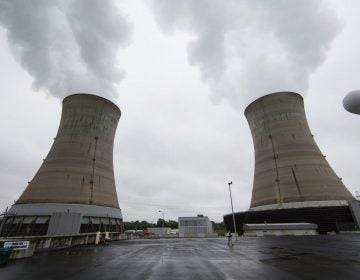U.S. Steel claims air pollution order could cost it $400 million
Allegheny County says the order is necessary to get the region's air within federal pollution limits.

U.S. Steel's Clairton Coke Works. (Reid R. Frazier/StateImpact Pennsylvania)
Attorneys for U.S. Steel say Allegheny County regulators issued an unreasonably harsh enforcement order over air pollution violations at its Clairton Coke Works, and claim the order could cost the company up to $400 million dollars to comply.
They made the claim at a Monday hearing for an appeal the company filed over a June enforcement order from the Allegheny County Health Department. The order was for violations at the company’s Clairton Coke Works, about 20 miles southeast of Pittsburgh.
In the order, the county fined the company $1 million for chronic violations. It said in the order the plant continued “to experience ever-increasing visible emissions and unexplained exceedance.” The agency also said U.S. Steel employees tried to mask air violations.
A key aspect of the order was a stipulation the company produce a plan to comply with its air quality permits, including an inventory of all potential pollution sources and how it will address them. If the plant failed to curb emissions from its 10 coke batteries, the agency said it would order the plant to put its two worst-performing coke batteries on “hot idle” until the plant improved its performance.
Mark Dausch, an attorney for U.S. Steel, said at the hearing that putting portions of the plant on ‘hot idle’–in which its ovens are kept heated but do not process coke — could damage the company’s equipment through “thermal stress.”
“The enforcement could cost tens to hundreds of millions of dollars and result in people losing their jobs,” he said. “In the worst case scenario,” he said, it could cost the company $400 million.
County officials pointed out that portions of the plant were put on hot idle during 2009, without apparent damage.
In questioning county health department officials, Dausch portrayed the penalty as overly severe, questioning whether the county had devised its standards for compliance on sufficient study. He also pointed out that the fine was based on an enforcement policy the county adopted in early 2018, even though many of the violations occurred before the newer, stricter policy was adopted.
Jim Kelly, deputy director for environmental health for the health department, said even though the enforcement policy was new, the air quality laws the plant was breaking were not. He also said the U.S. Steel should be able to comply.
“Nothing in this order requires something U.S. Steel hasn’t demonstrated they can do in the past,” he said to Dausch, who was questioning the agency’s methods for determining its penalty. “We’re in this situation because our inspectors have observed a lack of maintenance in your batteries.”
Kelly testified that as fugitive emissions violations rose at Clairton, so did pollution levels at the county’s air quality monitor at South Allegheny High School in Liberty, about a mile downwind from the coke works. After showing steep air pollution declines for years, those levels started going back up again in 2014, he said.
The Liberty monitor violates federal standards for particle pollution and sulfur dioxide, two pollutants that can cause heart and lung diseases. Clairton is the county’s largest source of particulate pollution, and coke oven emissions, a carcinogenic mix of pollutants.
Clairton is the largest coke works in North America, and employs 1,000 people. The plant processes metallurgical coal into coke, a key component of steelmaking, by baking the coal at high temperatures.
U.S. Steel turned a $291 million profit in the third quarter this year.
Matt Mehalik, executive director of the Breathe Collaborative, an environmental group, said the enforcement order was a way to get the company to comply with the law.
“No one really is allowed to speed illegally without risking lives of other people. And the same is true with the Clean Air Act,” he said. “People who are not complying with it are risking our health and should be brought back into compliance.”
A decision on the appeal from the health department’s hearing officer Max Slater isn’t expected for several months. Once the decision is rendered, either side can appeal.
WHYY is your source for fact-based, in-depth journalism and information. As a nonprofit organization, we rely on financial support from readers like you. Please give today.




